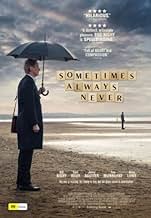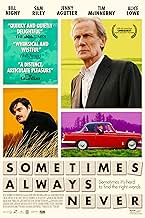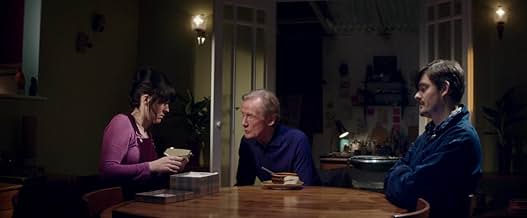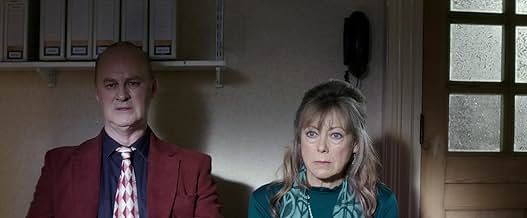AVALIAÇÃO DA IMDb
6,3/10
3,5 mil
SUA AVALIAÇÃO
Um drama de fantasia onde um pai se conecta com seu filho perdido através de palavras.Um drama de fantasia onde um pai se conecta com seu filho perdido através de palavras.Um drama de fantasia onde um pai se conecta com seu filho perdido através de palavras.
- Direção
- Roteirista
- Artistas
- Prêmios
- 1 vitória no total
Avaliações em destaque
A very surreal looking film. Interesting colours and tones and deliberate filming car scenes over a filmed background.
In essence it is about relationships and long-term grief ... and scrabble.
It is worth a watch.
In essence it is about relationships and long-term grief ... and scrabble.
It is worth a watch.
What a clever quirky little movie that proves when done well the British succeed where other fail.
No plot or spoilers here as it would ruin the movie but all the performances headed by Bill Nighy as Alan are superb. Bill Nighy plays droll eccentric old men better than anyone I can think of I can't imagine anyone else doing justice to this role. The last time I saw Bill Nighy in a movie was The Bookshop and even though it was not the starring role ,he played an almost Dickensian character he stole that movie
The only thing I'll say about the story is that it's about two families,both have suffered loss and both are bought together by the game of Scrabble.
The supporting cast of Sam Riley as Peter Alan's son and Jenny Agutter ,(out of habit as Sister Jullienne) well and truly in this film plays Margaret touchingly and with great humour ,this is a very funny movie ,almost a comedy but with a lot of pathos Tim McInnerny as Margaret 's droll husband is also very good. Also the rest of the cast Alice Lowe ,as Peters wife and Oliver Sindcup as young Peter are very very good.
Frank Cottrell Boyce ,who wrote screenplays for Goodbye Christopher Columbus ,Railway Man,and Hillary and Jackie among other films and television is one of the most respected writers for the British screen and it's easy to understand why.
I don't know much about director the Carl Hunter but if Sometimes Always Never is an example of his directing I hope to see more of his movies.
Don't miss this one.
No plot or spoilers here as it would ruin the movie but all the performances headed by Bill Nighy as Alan are superb. Bill Nighy plays droll eccentric old men better than anyone I can think of I can't imagine anyone else doing justice to this role. The last time I saw Bill Nighy in a movie was The Bookshop and even though it was not the starring role ,he played an almost Dickensian character he stole that movie
The only thing I'll say about the story is that it's about two families,both have suffered loss and both are bought together by the game of Scrabble.
The supporting cast of Sam Riley as Peter Alan's son and Jenny Agutter ,(out of habit as Sister Jullienne) well and truly in this film plays Margaret touchingly and with great humour ,this is a very funny movie ,almost a comedy but with a lot of pathos Tim McInnerny as Margaret 's droll husband is also very good. Also the rest of the cast Alice Lowe ,as Peters wife and Oliver Sindcup as young Peter are very very good.
Frank Cottrell Boyce ,who wrote screenplays for Goodbye Christopher Columbus ,Railway Man,and Hillary and Jackie among other films and television is one of the most respected writers for the British screen and it's easy to understand why.
I don't know much about director the Carl Hunter but if Sometimes Always Never is an example of his directing I hope to see more of his movies.
Don't miss this one.
I loved the movie. Bill Nighy is superb in anything he does, the rest of the cast were wonderful. It was written with humour, wittiness with a hint of sadness.
A single delicious narrative conceit drives the delightful Sometimes. Always. Never. (2018). It takes its own sweet time getting there, but when it does, it hits home: you can be an expert in words and their rules but be incapable of meaningful expression. Add a Scrabble obsession, mix it with deep grief and guilt, and you have a portrait of a family desperately unable to communicate with each other.
The simplicity of the plotline stands in stark contrast to the complexity of its themes. Dapper rule-bound tailor Alan (Bill Nighy) is told that the body of his long-missing son Michael may have been found. He takes his younger estranged son Peter (Sam Riley) with him to identify the body, and at the morgue they meet other parents who are there for the same reason. It's a diversion that does little to advance the narrative, but it does provide comic respite from the pain of loss. Both relieved and disappointed with the outcome, Alan invites himself to stay with Peter and his family in the hope of reconciliation.
With a threadbare plot, the power of this film comes from its theatrical settings, intelligent banter, and Nighy's trademark whimsical mannerisms and stylised performance. The label 'fantasy drama' has been applied to this film but is mis-leading and manifestly inadequate. If there is an element of fantasy, it derives from the way many scenes are played out against backgrounds that are have a surreal, even an absurdist two-dimensional feel that resembles a theatre set. Like all absurdism, there is an artful space between the underlying emotional intensity and the futility of ever trying to understand it. The gravelly Nighy is a master of under-statement, with a unique talent for giving shallow dialogue depth and humour. It's all about contrasts: Alan's obsession with a missing son and neglect of the son he still has; his fastidious Dymo labelling of everything as a substitute for control in his world; and his ability to make light of the heaviest emotions.
If you are not a Nighy fan or prefer action-based stories, you may find little to appreciate in this film. In place of a forward-moving narrative it offers a portrait of a dysfunctional family torn apart over guilt and the inability to emotionally connect. The film's title is itself a parody of form over function, referring to the tailor's rule for how jacket buttons should be fastened: the top always, the middle sometimes, the bottom never. With no substantive relationship to the film's content, it's a rule as good as any on how to live one's life.
The simplicity of the plotline stands in stark contrast to the complexity of its themes. Dapper rule-bound tailor Alan (Bill Nighy) is told that the body of his long-missing son Michael may have been found. He takes his younger estranged son Peter (Sam Riley) with him to identify the body, and at the morgue they meet other parents who are there for the same reason. It's a diversion that does little to advance the narrative, but it does provide comic respite from the pain of loss. Both relieved and disappointed with the outcome, Alan invites himself to stay with Peter and his family in the hope of reconciliation.
With a threadbare plot, the power of this film comes from its theatrical settings, intelligent banter, and Nighy's trademark whimsical mannerisms and stylised performance. The label 'fantasy drama' has been applied to this film but is mis-leading and manifestly inadequate. If there is an element of fantasy, it derives from the way many scenes are played out against backgrounds that are have a surreal, even an absurdist two-dimensional feel that resembles a theatre set. Like all absurdism, there is an artful space between the underlying emotional intensity and the futility of ever trying to understand it. The gravelly Nighy is a master of under-statement, with a unique talent for giving shallow dialogue depth and humour. It's all about contrasts: Alan's obsession with a missing son and neglect of the son he still has; his fastidious Dymo labelling of everything as a substitute for control in his world; and his ability to make light of the heaviest emotions.
If you are not a Nighy fan or prefer action-based stories, you may find little to appreciate in this film. In place of a forward-moving narrative it offers a portrait of a dysfunctional family torn apart over guilt and the inability to emotionally connect. The film's title is itself a parody of form over function, referring to the tailor's rule for how jacket buttons should be fastened: the top always, the middle sometimes, the bottom never. With no substantive relationship to the film's content, it's a rule as good as any on how to live one's life.
'Sometimes Always Never (2019)' is a bit of an oddity, I suppose, because of its combination of mundanity and quirkiness. It tells a grounded - though, ever-so-slightly absurdist - story with a real emotional weight to it, often with genuine subtlety but more frequently with a strange sort of passivity, and tends to toe the line between comedy and drama to the point that a distinction between the two isn't really worth making. It's not like it's particularly unfocused or haphazard, however, as it certainly feels calculated. Yet, even in its almost articulated unwillingness to conform to convention, there's a sort of intangible sense that it doesn't quite know how odd it is. It's exactly what it wants, and needs, to be. As you can tell, it's a fairly difficult experience to categorise. All in all, though, it's an enjoyable one. It has a compelling central theme and a nice set of main characters, even if the former isn't fleshed out as much as you'd like thanks to a somewhat baggy mid-section. The tone of the thing also fluctuates a little. Usually, it balances the serious with the silly, making sure that both do a decent job of developing character, but there are some moments that make you wish the movie would make its mind up as to whether or not its world is actually 'heightened' (which could be pushed further, if that is the case). It sometimes sounds overly 'written', too; this isn't necessarily a bad thing, but the sequences where you actually notice the writing pale in comparison to the ones where you don't. I'll also say that, while it's well directed overall, there are some visual stylistic choices that I don't think pay off. Of course, these issues don't prevent the flick from being generally entertaining. It's somewhat endearing, with great performances and (from what came through in the final result) a good screenplay. It's not perfect, or indeed overly satisfying, and its odd tone - or general 'status', I guess - does make it a bit difficult to get a handle on. Still, it's a good effort that nicely tells a personal, rather unique story. 6/10
Você sabia?
- CuriosidadesThe film is based on a short story called Triple Word Score, written by the script writer Frank Cottrrel Boyce.
- Erros de gravaçãoWhen Alan claims that "jazz" is a high-scoring word in Scrabble, a character corrects him by stating it's impossible to play since there's only one Z tile in the set. In reality, this word is indeed playable using "wild card" tiles. If using J, A, and Z tiles and a wild card tile in place of the other Z, the word would be a high-scoring word worth a minimum of 19 points.
- ConexõesFeatured in Projector: Sometimes Always Never (2019)
- Trilhas sonorasSometimes Always Never
Written by Edwyn Collins and Sean Read
Performed by Edwyn Collins, Sean Read and Chay Heney
Principais escolhas
Faça login para avaliar e ver a lista de recomendações personalizadas
- How long is Sometimes Always Never?Fornecido pela Alexa
Detalhes
- Data de lançamento
- Países de origem
- Central de atendimento oficial
- Idioma
- Também conhecido como
- Sometimes Always Never
- Locações de filme
- Empresas de produção
- Consulte mais créditos da empresa na IMDbPro
Bilheteria
- Faturamento bruto nos EUA e Canadá
- US$ 39.191
- Fim de semana de estreia nos EUA e Canadá
- US$ 2.599
- 14 de jun. de 2020
- Faturamento bruto mundial
- US$ 1.417.047
- Tempo de duração
- 1 h 31 min(91 min)
- Cor
- Proporção
- 2.35 : 1
Contribua para esta página
Sugerir uma alteração ou adicionar conteúdo ausente




































